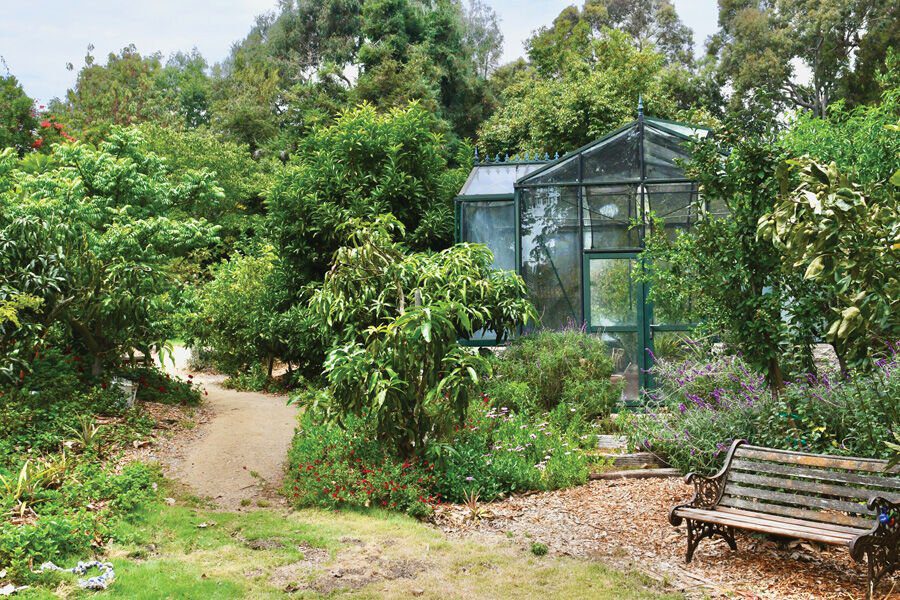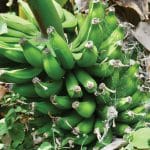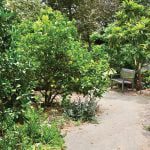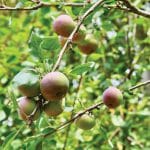
Humor columnist Burt Ross recently pitched a story lead. “There’s a unique, untold story right in the middle of Malibu,” he said. He proceeded to describe how Arnie Bernstein on Point Dume had hundreds of fruit trees on his property—“infinite varieties” of oranges, lemons, tangerines, mandarins, peaches, plums, apples and exotics. “Fruits you never heard of—fruits I never knew existed,” Ross said. “Who knew there are 32 varieties of some kinds of fruit?”
When reached for an interview, Bernstein was only too happy to oblige. The caretaker of this secret Garden of Eden could have been a comedian.
It turned out Arnie and his wife, Ellie, have lived in Malibu for nearly 50 years. A successful CPA (Certified Public Accountant), Bernstein has a particular fondness for fruit trees. He grew up in New York knowing very little about trees, and blames the NYC Board of Education for that lack of knowledge.
“I was a typical New Yorker—I thought, ‘a tree is a tree,’” he said. It wasn’t until his wife informed him that she had started learning about different kinds of trees in fourth grade that he realized this hole in his education and really started paying attention.
He first learned about eucalyptus trees and then discovered fruit trees.
“Fruit trees are an ideal landscape tree,” Bernstein said, “because they have beautiful flowers which later turn into fruit—a bonus.”
His interest and expertise in fruit trees grew and grew. He currently has over 400 fruit trees on his one-acre Point Dume property, and is a member of the nonprofit California Rare Fruit Growers, Inc. (CRFG).
“Rare fruit” is defined as a fruit that’s not commonly grown commercially, not normally grown in a particular area or climate, is scarce or almost extinct, has unusual properties or is of a new species.
He learned the techniques of grafting—transplanting a branch from one tree onto the trunk of another tree—nearly 40 years ago and has become such a master that he has taught the process to biology and agricultural students over the years. The students include those from Camarillo, Fillmore and Van Nuys high schools.
He has grafted as many as 20 different kinds of apples onto one tree.
Bernstein has also written and published a number of articles in The Fruit Gardener magazine of CFRG, including six articles on grafting, one on growing pineapples in Malibu and another on growing coffee in Malibu. He uses the nom de plume Agnes Philpot, aka Agnes the Exotic Fruit Lady.
“The Story of the Apple” by Agnes is a charming and humorous history of apples, including the fact that most were grown for hundreds of years so that hard cider could be imbibed in place of contaminated drinking water. An article about the use of wood chips as mulch used the quote “mulch ado about nothing.”
He considers two of the most exotic or unusual trees in his garden to be a Kei apple tree that originated in the southwestern African country of Namibia, and the Jaboticaba, also known as the Brazilian Grape Tree.
Bernstein buys his trees from all over the U.S. and sometimes needs a special botanical certificate to purchase from states like Florida and Hawaii.
When asked what he does with the fruit from over 400 trees, he joked, “I share it with the rats.”
When asked if he ever has problems with birds or insects eating his fruit, he replied, “The birds are my friends. They can eat whatever they want.” As far as insects, Bernstein said, “I have no insect problem—I’m organic.”
“If you give a tree the nourishment it wants, it will fight the insects on its own,” he continued. “Insects tell you the tree is not functioning or healthy.” In the event that someone else has an insect problem, he recommends spraying with a solution of dish soap, canola oil and baking powder.
All in all, Bernstein said he believes Malibu’s location at the 32nd parallel and its Mediterranean climate is absolute perfection and unique when it comes to having the ability to grow just about any fruit tree in the world—temperate, tropical or sub-tropical.
“This narrow geographic area has this enormous growth engine,” he said. “I grow apple trees next to banana trees.”
His most notable failure at trying to grow a particular tree was with the mangosteen—a tropical evergreen tree with edible fruit native to Malaysia.
“I’ve tried to grow that tree three times,” Bernstein lamented. “The guy I kept buying them from finally told me that if I wanted to save money on shipping, I could just pay for the tree and he’d kill it for me.”
Bernstein strives to make his garden attractive to children so they will be inspired by the trees. He conducts a limited number of tours (limited further by COVID-19), giving priority to Malibu students.



